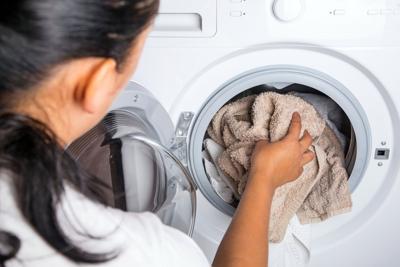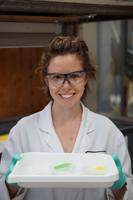In the crevices of a damp bath towel, all kinds of bacteria are proliferating.
They arrive in droves, wiped off their hosts along with dead skin, fungi and other microorganisms. They thrive on the towelŌĆÖs moisture, the time spent hung up in a misty bathroom after a hot shower. And they multiply and multiply, waiting for the next chance to be used by an unsuspecting human.
That is the environment you expose yourself to with every morning shower. Presented like that, you may have already booked ŌĆ£towel burningŌĆØ into your calendar, right between ŌĆ£bleach the bathroomŌĆØ and ŌĆ£take a long, hot shower (new towel necessary).ŌĆØ
Canadians are split on how often to wash their bath towel. Seventy-two per cent say they wash their bathroom towels once a week or more and another 19 per cent wash once every two weeks, according to a by Narrative Research and the Logit Group.
About one in 10 Canadians say they wash their bathroom towels only once a month or less.
Here’s what the experts say is the right answer.
Is there a scientific answer to how often I should wash my towel?
There are ways of lessening the damage weŌĆÖre doing to our skin microbiome, experts say.
According to Allison McGeer, a scientist at Sinai Health and expert in infectious diseases, no.
ŌĆ£If youŌĆÖre talking about risk of infection,ŌĆØ McGeer said, ŌĆ£there is no evidence to guide you.ŌĆØ
The odds of getting an infection from not washing your towel enough are ŌĆ£so low as to be irrelevant for most people,ŌĆØ according to McGeer, also a professor at the University of Toronto. The exception, according to University of Waterloo microbiologist Josh Neufeld, is for people who are immunocompromised.
“For most people, whatever you’re doing is probably fine,” Neufeld said. “You can get away with a lot.”
The microbes on your towel come from your skin and are normal residents of your body, so they’re unlikely to make you sick.
ThereŌĆÖs a long list of other things that are much more likely to cause infection, even within your own home ŌĆö like sharing a toothbrush, for example, or spending time in close contact with others.
How often should I wash my towel?
But it’s not just about infection risk ŌĆö personal hygiene and your personal “ew” factor matter, too.
Each time you use a towel, it picks up dead skin and microorganisms, according to Lindsay Kalan, a professor at McMaster University and the Canada Research Chair in the skin microbiome and infectious disease. And because bacteria loves moisture, they will grow on your towel.
ŌĆ£If things arenŌĆÖt able to dry, youŌĆÖre going to have just a breeding ground for bacteria,ŌĆØ Kalan said.
Ultimately, Kalan recommends washing your towel once a week. She recommends the same for your sheets.
Meanwhile, the American Cleaning Institute, which represents the U.S. cleaning products industry, recommends washing your towel after three to five uses.
You can always use the smell test: If the towel stinks, Kalan explains, thatŌĆÖs bacteria growing.
ŌĆ£Bacteria are really good at letting us know theyŌĆÖre there,ŌĆØ she said.
How can I keep it clean between uses?
Try to keep your towel dry when youŌĆÖre not using it. Microbes need water to grow, and by keeping your towel dry, many of the microbes will die, Neufeld said. He compared it to what grows in a rainforest versus a desert: “Keep it like a desert between uses and less will grow in it.”
You shouldn’t throw your towel into the hamper while it’s still wet, either ŌĆö but you’ll probably undo any harm when you wash it.
It also helps to keep the toilet seat down when you flush. Otherwise, particles from the toilet might be sent flying across your bathroom, and potentially onto your towel.
Should I use someone elseŌĆÖs towel?
ItŌĆÖs generally not recommended, Kalan said. The advice is, predictably, the same when the other person is sick ŌĆö but itŌĆÖs more of a precautionary measure than anything else, according to McGeer.
ŌĆ£If you donŌĆÖt want to get ill from somebody else in your house who is sick,ŌĆØ McGeer said, ŌĆ£the towels donŌĆÖt matter.ŌĆØ
Research shows that people in the same household start to acquire each otherŌĆÖs microbiomes, so even without sharing a towel, ŌĆ£weŌĆÖre always sharing microbes with the people around us,ŌĆØ Kalan said.
If you do share a towel, you’ll have to clean it more often, because it’s being used more and has less time to dry between uses, Neufeld said.
How should I wash my towel?
Kalan recommends washing your towel at a warmer temperature to ensure youŌĆÖre killing the bacteria, but McGeer says the difference ŌĆ£is not huge.ŌĆØ
Neufeld said he personally wouldn’t use hot temperatures for every wash, unless he notices the towel is smelling.
The biggest effect will be simply using running water and detergent, which helps physically remove bacteria and other materials, McGeer said.
Using antibacterial detergent isnŌĆÖt necessary ŌĆö the cost it does to the environment in putting chemicals into wastewater isnŌĆÖt worth the reward, McGeer said. And there’s a risk to making things too clean, according to Neufeld.
“These are naturally-occurring micro-organisms on our bodies,” he said. “In many cases, they’re important for our health.”
The biggest message, McGeer said, is that when it comes to infection, ŌĆ£towels are just not that important.ŌĆØ
ŌĆ£Nobody thinks itŌĆÖs a big enough problem to worry about,ŌĆØ she said.























To join the conversation set a first and last name in your user profile.
Sign in or register for free to join the Conversation